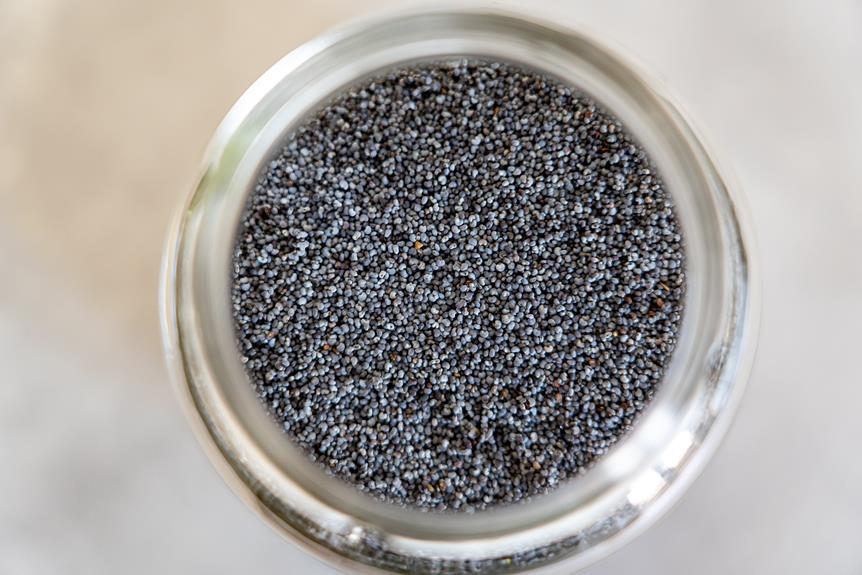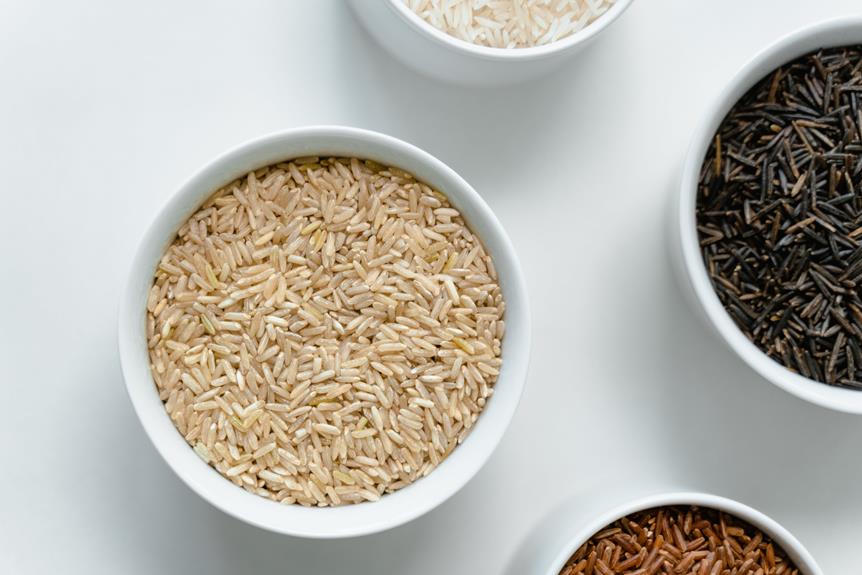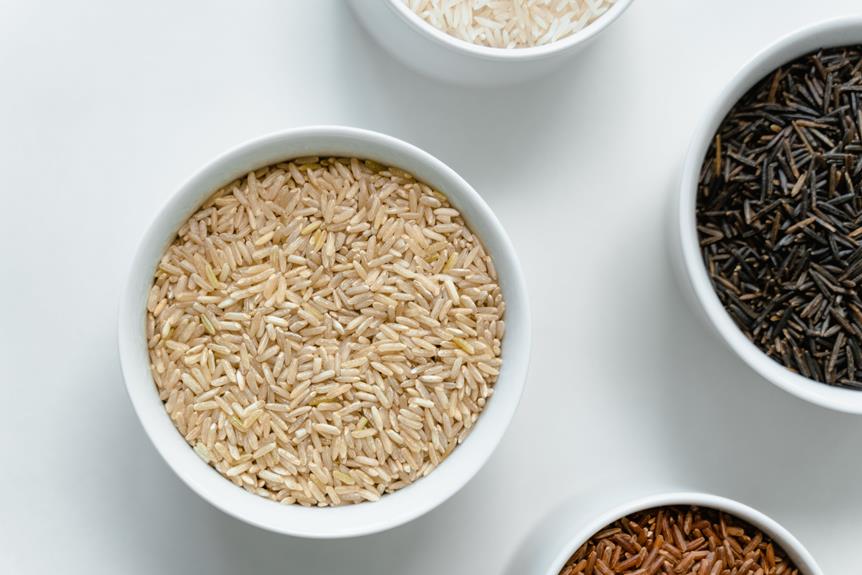Did you know that dietary fiber plays a crucial role in maintaining a healthy gut? You might be surprised to learn that it does much more than just promote bowel regularity. In fact, dietary fiber has seven key roles in gut health that you may not be aware of. From enhancing the gut microbiota to managing blood sugar levels, the benefits of dietary fiber are far-reaching. But what exactly are these roles and how do they contribute to your overall well-being? Let's explore further and uncover the secrets of dietary fiber's impact on gut health.
Key Takeaways
- Gut microbiota support is essential for a healthy digestive system, and fiber-rich foods promote their growth and diversity.
- Dietary fiber plays a vital role in promoting bowel regularity, preventing constipation, and supporting smooth elimination.
- Enhanced digestive function is achieved through the use of fiber as a bulk-forming agent and its ability to balance pH levels and slow down glucose absorption.
- Fiber-rich foods aid in preventing constipation, maintaining regular bowel movements, and increasing stool bulk for smooth elimination.
Enhancing Gut Microbiota
Enhancing your gut microbiota is crucial for maintaining a healthy digestive system. Your gut microbiota refers to the trillions of bacteria and other microorganisms that reside in your gastrointestinal tract. These microorganisms play a vital role in various aspects of your health, including digestion, nutrient absorption, and immune function.
Dietary fiber is an essential component in enhancing your gut microbiota. It serves as a source of fuel for the beneficial bacteria in your gut, promoting their growth and diversity. When you consume fiber-rich foods, such as fruits, vegetables, whole grains, and legumes, the bacteria in your gut break down the fiber into short-chain fatty acids. These fatty acids provide nourishment to the cells lining your colon and help maintain a healthy gut environment.
Moreover, a diverse and balanced gut microbiota is associated with improved digestive health. It helps to prevent the overgrowth of harmful bacteria and may reduce the risk of conditions such as irritable bowel syndrome (IBS), inflammatory bowel disease (IBD), and colorectal cancer. By enhancing your gut microbiota, you can support a healthy gut ecosystem and reduce the risk of gastrointestinal disorders.
To enhance your gut microbiota, it is recommended to consume a variety of fiber-rich foods on a regular basis. Aim for a daily intake of 25-38 grams of fiber, depending on your age and sex. Include a mix of soluble and insoluble fiber sources in your diet, as they have different effects on your gut microbiota. Soluble fiber is found in foods like oats, beans, and citrus fruits, while insoluble fiber is present in foods like whole wheat, nuts, and vegetables.
Promoting Bowel Regularity
To promote bowel regularity, dietary fiber plays key roles in enhancing your digestive function, preventing constipation, and supporting smooth elimination. By adding fiber-rich foods to your diet, such as fruits, vegetables, whole grains, and legumes, you can increase the bulk of your stool, making it easier to pass. Additionally, fiber helps regulate the speed at which waste moves through your intestines, preventing both diarrhea and constipation.
Enhancing Digestive Function
Including dietary fiber in your daily meals can help promote bowel regularity and enhance your digestive function. Fiber acts as a bulk-forming agent, adding volume to your stool and making it easier to pass through your digestive system. This helps to prevent constipation and keeps your bowel movements regular. Additionally, fiber can help balance the pH levels in your gut, creating an optimal environment for good bacteria to thrive. This promotes a healthy gut microbiome and improves overall digestive function. Moreover, fiber can also regulate blood sugar levels by slowing down the absorption of glucose in the bloodstream. This can be particularly beneficial for individuals with diabetes or those at risk of developing the condition. By including fiber-rich foods like fruits, vegetables, whole grains, and legumes in your diet, you can enhance your digestive function and maintain bowel regularity.
Preventing Constipation
Promote bowel regularity and prevent constipation by incorporating dietary fiber into your daily meals. Fiber adds bulk to your stool, making it easier to pass through your digestive system. It also helps to soften your stool, preventing it from becoming hard and difficult to pass. By including fiber-rich foods such as fruits, vegetables, whole grains, and legumes in your diet, you can maintain regular bowel movements and prevent constipation.
To further emphasize the importance of dietary fiber in preventing constipation, here is a table showcasing some fiber-rich foods:
| Fiber-Rich Foods | Fiber Content (per serving) |
|---|---|
| Apples | 4 grams |
| Broccoli | 5 grams |
| Oatmeal | 4 grams |
| Lentils | 15 grams |
| Chia Seeds | 10 grams |
Incorporating these foods into your meals can help you meet your daily fiber needs and promote optimal bowel regularity.
Supporting Smooth Elimination
Incorporating dietary fiber into your daily meals supports smooth elimination and promotes bowel regularity. Here are four ways fiber can help:
- Increased stool bulk: Fiber adds bulk to your stool, making it easier to pass through the digestive system.
- Improved bowel movements: Fiber helps regulate the speed at which food moves through your intestines, preventing both diarrhea and constipation.
- Reduced straining: By softening the stool and promoting regular bowel movements, fiber reduces the need for excessive straining during elimination.
- Enhanced gut health: Fiber acts as food for beneficial gut bacteria, promoting a healthy balance of microorganisms in your digestive system.
Supporting Digestive Enzyme Production
You may be wondering how dietary fiber can support digestive enzyme production. Well, it's quite simple. Enzymes play a crucial role in breaking down the food you eat, and fiber helps to stimulate their production in the gut. By including fiber-rich foods in your diet, you can ensure that your body has the necessary enzymes to efficiently digest and absorb nutrients.
Enzyme Production Benefits
Consuming an adequate amount of dietary fiber can play a significant role in supporting the production of digestive enzymes in your gut. This is important because digestive enzymes are responsible for breaking down the food you eat into smaller, more easily absorbable molecules. Here are some benefits of enzyme production that are supported by dietary fiber:
- Increased breakdown of carbohydrates: Fiber stimulates the production of amylase, an enzyme that helps break down complex carbohydrates into simpler sugars.
- Enhanced protein digestion: Fiber promotes the production of protease enzymes, which aid in the breakdown of proteins into amino acids.
- Improved fat digestion: Lipase enzymes, supported by fiber, play a crucial role in breaking down fats into fatty acids and glycerol.
- Better nutrient absorption: By facilitating the production of digestive enzymes, fiber helps ensure that your body can efficiently absorb and utilize essential nutrients from the food you eat.
Fiber and Digestion
To understand the impact of dietary fiber on digestion, it is essential to explore how it supports the production of digestive enzymes in your gut. Fiber plays a crucial role in promoting the production of these enzymes, which are responsible for breaking down food into smaller, more easily digestible components. When you consume fiber-rich foods, such as fruits, vegetables, and whole grains, it provides the necessary substrate for the growth of beneficial gut bacteria. These bacteria, in turn, produce enzymes that aid in the breakdown and absorption of nutrients from the food you eat. By supporting the production of digestive enzymes, fiber ensures that your body can efficiently extract the essential nutrients it needs for optimal health. So, including fiber in your diet is key to maintaining healthy digestion.
Gut Enzyme Support
Supporting digestive enzyme production is a key aspect of gut enzyme support. When it comes to maintaining a healthy gut, ensuring adequate production of digestive enzymes is essential. These enzymes play a crucial role in breaking down food and absorbing nutrients effectively. Here are a few ways to support digestive enzyme production:
- Consume a diet rich in fruits and vegetables, as they are packed with natural enzymes that aid digestion.
- Include fermented foods like yogurt, sauerkraut, and kefir in your diet, as they contain probiotics that help enhance enzyme production.
- Take digestive enzyme supplements, especially if you have a condition that affects enzyme production or digestion.
- Avoid excessive consumption of processed foods, as they are often devoid of natural enzymes and can hinder digestive processes.
Preventing Constipation and Diarrhea
Eating a diet rich in dietary fiber can help prevent and alleviate both constipation and diarrhea. Fiber adds bulk to your stool, making it easier for it to pass through your digestive system. This helps prevent constipation by promoting regular bowel movements. When you consume enough fiber, it absorbs water and adds moisture to your stool, making it softer and easier to pass. This can help prevent the discomfort and straining associated with constipation. Additionally, fiber acts as a prebiotic, providing nourishment for beneficial bacteria in your gut. These bacteria play a crucial role in maintaining a healthy gut environment and preventing diarrhea.
In cases of diarrhea, fiber can help regulate bowel movements by absorbing excess water and adding bulk to the stool. This can help firm up loose stools and reduce the frequency of bowel movements. However, it's important to note that not all types of fiber are suitable for managing diarrhea. Soluble fiber, found in foods like oats, apples, and beans, is beneficial in this case, as it can help absorb excess water and thicken the stool. On the other hand, insoluble fiber, found in foods like whole grains and vegetables, can worsen diarrhea symptoms. It is important to consume a balanced amount of both types of fiber to promote gut health.
To prevent constipation and diarrhea, aim to include a variety of fiber-rich foods in your diet. Fruits, vegetables, whole grains, legumes, and nuts are all excellent sources of dietary fiber. It is recommended to gradually increase your fiber intake and drink plenty of water to aid digestion. If you are experiencing persistent constipation or diarrhea, it is advisable to consult with a healthcare professional for proper evaluation and guidance.
Managing Blood Sugar Levels
Managing blood sugar levels is crucial for maintaining overall health and well-being. It plays a significant role in preventing chronic conditions such as diabetes and obesity. By incorporating dietary fiber into your daily diet, you can effectively manage your blood sugar levels and improve your overall health. Here are four ways in which dietary fiber helps in managing blood sugar levels:
- Slowing down digestion: Dietary fiber, particularly soluble fiber, slows down the digestion process, which in turn helps to regulate the release of sugar into the bloodstream. This prevents sudden spikes in blood sugar levels and helps maintain a steady level throughout the day.
- Increasing insulin sensitivity: Insulin is a hormone responsible for regulating blood sugar levels. Consuming a diet rich in fiber can increase your body's sensitivity to insulin, making it more effective in transporting glucose from the bloodstream into the cells for energy.
- Promoting satiety: Foods high in dietary fiber, such as fruits, vegetables, and whole grains, tend to be more filling and satisfying. This can help control your appetite and prevent overeating, thereby managing blood sugar levels by avoiding large glucose spikes after meals.
- Reducing the glycemic index: The glycemic index (GI) measures how quickly a food raises blood sugar levels. Foods high in fiber generally have a lower GI, as they take longer to digest and release sugar into the bloodstream. Including fiber-rich foods in your meals can help lower the overall glycemic index of your diet.
Incorporating dietary fiber into your daily meals is an effective way to manage blood sugar levels and promote overall health. Remember to choose a variety of fiber-rich foods and gradually increase your fiber intake to avoid digestive discomfort. By making these simple changes to your diet, you can take control of your blood sugar levels and maintain optimal health.
Lowering Cholesterol Levels
Incorporating dietary fiber into your daily meals can play a key role in lowering cholesterol levels. High cholesterol levels can increase your risk of heart disease and other cardiovascular problems. By including fiber-rich foods in your diet, you can help reduce the levels of LDL cholesterol, also known as "bad" cholesterol, and maintain a healthy heart.
Fiber works in two ways to lower cholesterol. Firstly, soluble fiber binds to cholesterol in the digestive system and prevents its absorption into the bloodstream. This means that less cholesterol is circulating in your body, reducing the risk of plaque buildup in the arteries. Secondly, fiber-rich foods can help increase the production of bile acids, which are made from cholesterol. This process requires the use of cholesterol from the bloodstream, leading to lower cholesterol levels overall.
Here is a table highlighting some fiber-rich foods that can aid in lowering cholesterol levels:
| Food | Serving Size | Fiber Content (grams) |
|---|---|---|
| Oats | 1 cup | 16 |
| Beans | 1 cup | 15 |
| Brussels Sprouts | 1 cup | 6 |
| Flaxseeds | 2 tablespoons | 6 |
| Avocado | 1 medium | 9 |
Boosting Immune Function
Consuming a diet rich in fiber can play a crucial role in enhancing your immune function. Fiber is known for its ability to support gut health, but it also has important implications for your immune system. Here's how a fiber-rich diet can help boost your immune function:
- Promotes a diverse gut microbiota: Fiber acts as a prebiotic, providing nourishment for beneficial bacteria in your gut. A diverse gut microbiota is linked to a stronger immune system, as these bacteria help regulate immune responses and protect against harmful pathogens.
- Enhances antibody production: Certain types of fiber, such as beta-glucans found in oats and barley, are known to stimulate the production of antibodies. Antibodies play a key role in recognizing and neutralizing foreign invaders, helping your immune system effectively fight off infections.
- Reduces inflammation: Chronic inflammation can weaken your immune system and increase the risk of various diseases. Soluble fiber, like that found in fruits, vegetables, and legumes, has anti-inflammatory properties that can help reduce inflammation and support immune function.
- Supports healthy gut barrier function: The gut barrier acts as a protective barrier, preventing harmful substances from entering the bloodstream. Fiber helps maintain the integrity of the gut barrier by promoting the production of mucus and supporting the growth of beneficial bacteria, which can help prevent infections and support immune health.
Frequently Asked Questions
How Does Dietary Fiber Enhance Gut Microbiota?
Dietary fiber enhances gut microbiota by providing nourishment to beneficial bacteria in your gut. When you consume fiber-rich foods, these bacteria break down the fiber into short-chain fatty acids, such as butyrate. These fatty acids serve as an energy source for the cells lining your intestines, promoting their health and function. Additionally, fiber helps to regulate bowel movements and prevent constipation, keeping your gut healthy and balanced.
What Are the Benefits of Promoting Bowel Regularity?
Promoting bowel regularity has several benefits for your overall health. When you have regular bowel movements, it helps prevent constipation and the discomfort associated with it. It also aids in the removal of waste and toxins from your body, ensuring proper digestion and absorption of nutrients. Additionally, maintaining bowel regularity can reduce the risk of developing certain diseases, such as hemorrhoids and diverticulosis. Including dietary fiber in your diet is an effective way to promote bowel regularity and enjoy these benefits.
How Does Dietary Fiber Support Digestive Enzyme Production?
Dietary fiber supports digestive enzyme production by providing a substrate for these enzymes to act upon. When you consume fiber-rich foods, they pass through your digestive system undigested. As they do, they stimulate the release of digestive enzymes, which break down the fiber into smaller, more easily absorbed molecules. This process not only helps with the digestion of fiber but also supports the overall function of your digestive system. So, including fiber in your diet can help promote healthy digestive enzyme production.
Can Dietary Fiber Prevent Both Constipation and Diarrhea?
Dietary fiber can help prevent both constipation and diarrhea. It adds bulk to your stool, making it easier to pass and preventing constipation. At the same time, it absorbs water and adds moisture to your stool, preventing it from becoming too hard and causing diarrhea. By regulating bowel movements, fiber promotes regularity and helps maintain a healthy balance in your digestive system. So, including fiber-rich foods in your diet can be beneficial for preventing both constipation and diarrhea.
How Does Dietary Fiber Help in Managing Blood Sugar Levels?
Dietary fiber helps in managing blood sugar levels by slowing down the absorption of glucose in your body. When you consume foods rich in fiber, such as fruits, vegetables, and whole grains, the fiber forms a gel-like substance in your gut. This slows down the digestion process, which in turn slows down the release of glucose into your bloodstream. As a result, your blood sugar levels remain more stable, reducing the risk of spikes and crashes.




